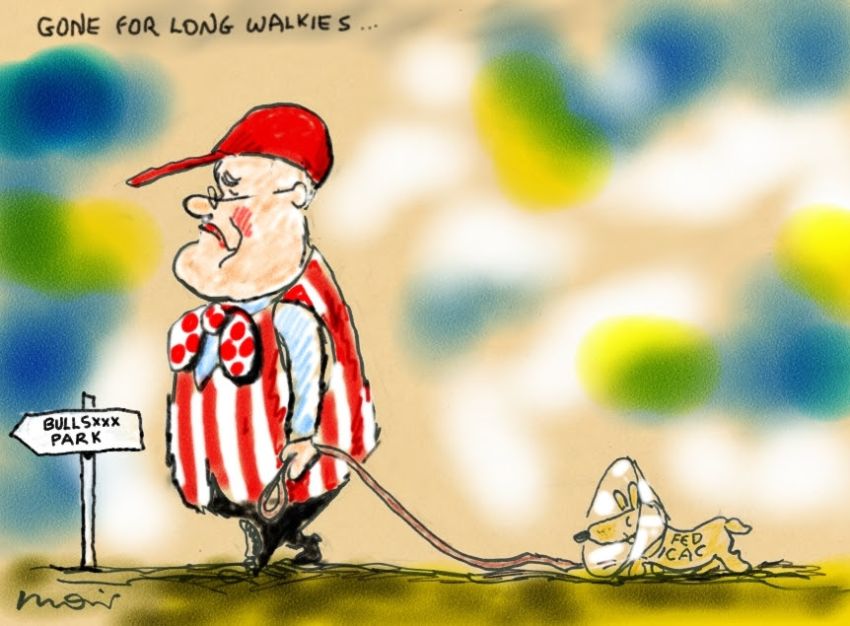
Asked recently why Australia still doesn’t have a federal anti-corruption commission, Prime Minister Scott Morrison used the excuse that he is preoccupied with the pandemic and the economic recovery.
Yet, as we can see from the special COVID-19 commission of corporate CEOs Morrison has appointed to chart the recovery, corruption is virtually inevitable. The National COVID-19 Coordination Commission, which is charting the gas-led economic “recovery”, is headed by Neville Power who, until late May, was the deputy chair of gas company Strike Energy, until he was forced to stand aside.
The latest corruption scandal involves the federal government paying an inflated $30 million to Liberal Party donors for land worth $3 million near the new Western Sydney airport. Simon Atkinson, head of the federal infrastructure department, just acknowledged in the Senate inquiry that it looks like officials attempted a cover-up.
Then, there was the “sports rorts” affair, which showed the Coalition spending $100 million on the seats it was trying to win. Six grants were paid, without an application form even having been filled in by the club receiving the money. There was some evidence that Scott Morrison and his office oversaw the process, but Morrison blamed National Party minister Bridget McKenzie. The Australian National Audit Office was scathing about the way the program was managed.
The NSW Independent Commission Against Corruption investigations into disgraced former state MP Darryl Maguire’s business affairs is showing that MPs are so used to power without accountability, they are surprised when asked to be transparent.
Now, the Premier has been found to have been involved directly in approving more than $100 million in council grants in Coalition-held seats before the last state election — considerably bigger than the federal sports rorts scandal.
Corruption is also being uncovered at a local government level.
In Victoria, where council elections are about to end, The Age reported that candidates for Greater Dandenong City Council are either developers or real estate agents. Dandenong Council is located beside Casey Council, which was sacked in February over corrupt payments to several councillors by developer John Woodman.
Woodman funded several candidates in the 2016 Casey Council elections. He also paid former Casey council mayor Sam Aziz and former Casey councillor Geoff Ablett $1.2 million to have land rezoned. They voted to rezone without declaring any conflict of interest.
Casey Council was only sacked after Victoria’s Independent Broad-based Anti-corruption Commission (IBAC) began hearing evidence, 18 months after The Age revealed the allegations. The IBAC heard evidence that wording for a motion on the rezoning had been emailed to a councillor by one of Woodman’s associates.
A developer and a real estate agent are running for the Moreland City Council, where I am an elected councillor.
In the lead-up to the Queensland elections, in a strange turn of events, the Liberal National Party referred Queensland leader Deb Frecklington to the Queensland Electoral Commission over fundraising dinners with wealthy Liberal Party donors, including property developers. Under Queensland law, developer donations are illegal. Federal Home Affairs minister Peter Dutton hosted the dinners along side Frecklington.
No wonder the calls for a federal anti-corruption agency are mounting.
Independent anti-corruption organisations exist in New South Wales, Victoria, Queensland, Western Australia, South Australia and Tasmania.
A federal anti-corruption commission is needed, as are stronger and well-funded anti-corruption commissions at the state level.
Some, such as IBAC need stronger powers. NSW ICAC can investigate any allegation of corruption, which makes it difficult for someone under investigation to obstruct or delay it by launching proceedings for a court injunction. However, IBAC needs a much higher threshold of evidence to hold a full inquiry. It cannot properly investigate police corruption.
But these accountability bodies can also be threatened.
This year, funding was cut to the Australian National Audit Office — payback perhaps for its criticism of the sport rorts in 2019. Auditor General Grant Hehir said that funding cuts over time means that without greater funding there will inevitably be fewer audits, making criminal activity less likely to be exposed.
While we need to fight for a federal independent anti-corruption commission and stronger anti-corruption bodies at state and territory levels, none guarantee transparency.
Anti-corruption commissions can only do so much when politicians, senior bureaucrats and wealthy business people are so intertwined. The widespread privatisation of government enterprises and services has opened up opportunities for both corruption and profit-gouging.
The level of secrecy surrounding business and government contracts and behind closed door briefings of politicians and at local government level can facilitate corruption, or at the very least, dodgy deals.
That is why it is so important for workers and their unions and grassroots social and environmental movements to be actively involved in both forcing accountability and stopping or reversing privatisations. The more active and mobilised the community is, the more difficult it is for politicians, business people and bureaucrats to get away with corruption.
[Sue Bolton is a member of the Socialist Alliance national executive. She is also a socialist councillor who is running for reelection for Moreland City.]